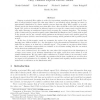Free Online Productivity Tools
i2Speak
i2Symbol
i2OCR
iTex2Img
iWeb2Print
iWeb2Shot
i2Type
iPdf2Split
iPdf2Merge
i2Bopomofo
i2Arabic
i2Style
i2Image
i2PDF
iLatex2Rtf
Sci2ools
140
click to vote
SIGECOM
2011
ACM
2011
ACM
Only valuable experts can be valued
Suppose a principal Alice wishes to reduce her uncertainty regarding some future payoff. Consider a self-proclaimed expert Bob that may either be an informed expert knowing an exact (or approximate) distribution of a future random outcome that may affect Alice’s utility, or an uninformed expert who knows nothing more than Alice does. Alice would like to hire Bob and solicit his signal. Her goal is to incentivize an informed expert to accept the contract and reveal his knowledge while deterring an uninformed expert from accepting the contract altogether. The starting point of this work is a powerful negative result (Olszewski and Sandroni, 2007), which tells us that in the general case for any contract which guarantees an informed expert some positive payoff an uninformed expert (with no extra knowledge) has a strategy which guarantees him a positive payoff as well. At the face of this negative result, we reexamine the notion of an expert and conclude that knowing some hidden var...
Related Content
| Added | 17 Sep 2011 |
| Updated | 17 Sep 2011 |
| Type | Journal |
| Year | 2011 |
| Where | SIGECOM |
| Authors | Moshe Babaioff, Liad Blumrosen, Nicolas S. Lambert, Omer Reingold |
Comments (0)

